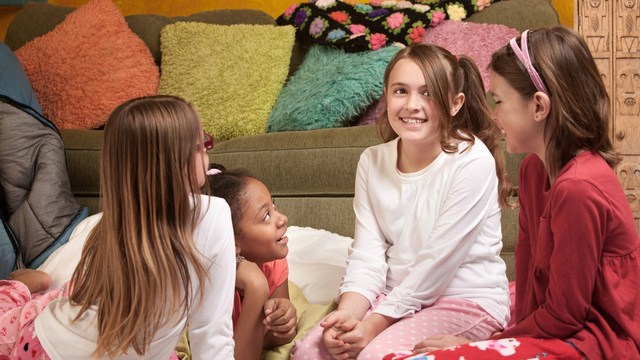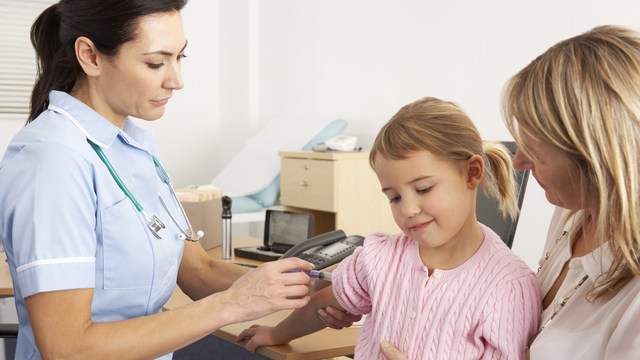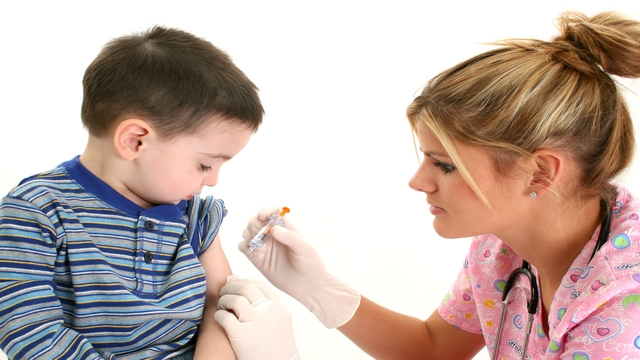 Scott Griessel-Creatista/PhotoSpin
Scott Griessel-Creatista/PhotoSpin
The purpose of this article is not to judge or condemn or even debate vaccination. Rather, its purpose is to examine the ethics of deliberately spreading and sharing the disease through chickenpox parties.
For those who haven’t been vaccinated or who have weakened immune systems, exposure to the virus from a child who has been to a chickenpox party could mean potential severe complications.
Chickenpox parties can end up spreading the virus to people without them even knowing they’ve been exposed, or knowing that there was a threat of exposure.
Chickenpox isn't just a harmless childhood disease
Chickenpox is thought of as a relatively harmless, rite-of-passage kind of childhood disease. Many believe that chickenpox only makes kids itchy for 10 days, and keeps them home from school and mom or dad home from work, or otherwise juggling childcare.
Chickenpox can actually have very severe, life-threatening and fatal complications for both unimmunized infants, children and adults. The vaccine has significantly reduced the numbers of cases and related complications. Still, healthy, unvaccinated children and adults can catch the virus and face complications and death.
Before the chickenpox vaccine was introduced in 1995, about “4 million people would get the disease each year. Also, about 10,600 people were hospitalized and 100 to 150 died each year because of chickenpox.” (1)
Read this true story about a mom’s experience with chickenpox: Varicella (Chickenpox): Unprotected Story
Still think it’s harmless?
Complications of chickenpox
Complications of chickenpox can include:
• Dehydration from vomiting and diarrhea
• Pneumonia for 1 in 1000 children
• Bleeding problems
• Infection or inflammation of the brain (encephalitis)
• Bacterial infections of the skin and soft tissues in children including Group A streptococcal infections (responsible for strep throat, flesh-eating disease, streptococcal toxic shock syndrome)
• Blood stream infections (sepsis)
• Bone infections
• Joint infections (2)
Those at greatest risk for complications include:
• Infants
• Teens
• Adults
• Pregnant women
• People with compromised immune systems due to HIV/AIDS, cancer, transplants, chemotherapy, immunosuppressive medications or long-term use of steroids (2)
Chickenpox and adults and pregnant women
“Many of the healthy adults who die from chickenpox contracted the disease from their unvaccinated children.” (2) Some children develop life-threatening secondary infections, brain infections, flesh-eating bacterial infections, and one in 1000 children develop severe pneumonia. (3)
Adults with the virus are more likely to be hospitalized, and approximately 5-14 percent of them develop lung problems, such as pneumonia. (4) One such very public case is that of Barbara Walters, who came down with chickenpox in January, 2013. You can learn about her story here http://abcnews.go.com/Entertainment/barbara-walters-chicken-pox/story?id=18334962
If a pregnant woman contracts chickenpox, her baby could be at risk for:
• “Scarring of the skin, eye defects, small limbs and neurological abnormalities – if the mother is infected in the first 20 weeks of pregnancy
• “Shingles in the first few years of life – if the mother is infected between weeks 20 and 36 of pregnancy
• “Chickenpox in the newborn – if the mother is infected up to four weeks before the birth
• “More severe effects for the newborn – if the mother is infected within seven days of the birth.” (5)
“An infected person is contagious for one to two days (possibly five days) before the onset of the rash and remains infectious until the blisters form scabs (usually around day five of the illness).” (5)
Even though the risk of infections and deaths related to chickenpox complications is low, for those who have lost loved ones, just one death is one too many.
Participating in a chickenpox party is simply taking a chance not only with your child’s life, but also with the lives of those around you who may not have been vaccinated or have exposure immunity.
There’s no way to predict which children will experience complications or not, or to know which people may not be immune. Chickenpox is contagious between one and five days before the spots even appear, which means your child could expose hundreds of people before he or she is confined at home. (5)
Sources:
1) Chickenpox (Varicella) Vaccination. Centers for Disease Control and Prevention. Web. Accessed: Feb 3, 2014
http://www.cdc.gov/chickenpox/vaccination.html
2) Chickenpox (Varicella) Complications. Centers for Disease Control and Prevention. Web. Accessed: Feb 3, 2014.
http://www.cdc.gov/chickenpox/about/complications.html
3) Chickenpox Parties. Swanson, Wendy Sue. Seattle Children’s Hospital Research Foundation. Web. Accessed: Feb 3, 2014.
http://seattlemamadoc.seattlechildrens.org/chickenpox-parties
4) Complications of chickenpox. National Health Services. Web. Accessed: Feb 3, 2014.
http://www.nhs.uk/Conditions/Chickenpox/Pages/Complications.aspx
5) Chickenpox. Better Health Channel. Government of Victoria, Australia. Web. Accessed: Feb 3, 2014.
http://www.betterhealth.vic.gov.au/bhcv2/bhcarticles.nsf/pages/Chickenpox
Reviewed February 3, 2014
by Michele Blacksberg RN
Edited by Jody Smith






Add a Comment1 Comments
Chickenpox is an airborne disease which spreads easily through coughing or sneezing by ill individuals or through direct contact with secretions from the rash. A person with chickenpox is infectious one to two days before the rash appears.
May 24, 2014 - 9:07amThis Comment